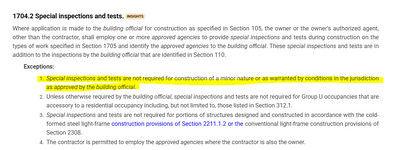theory2code2practice
Structural
- Apr 25, 2024
- 19
As the design engineer, whose responsibility is it to get the construction inspected according to building code?
I am coming across many many many contractors, all of which have been "doing this for 30 years" of course, that have no idea about special inspections.
Clearly they are not having the construction inspected. Is anyone else coming across this problem? How do you deal with contractors either not following the drawings or not following building code?
Any Ideas? Similar experiences?
I am coming across many many many contractors, all of which have been "doing this for 30 years" of course, that have no idea about special inspections.
Clearly they are not having the construction inspected. Is anyone else coming across this problem? How do you deal with contractors either not following the drawings or not following building code?
Any Ideas? Similar experiences?


